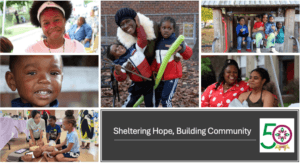
Margaret’s Village is a 501(c)(3) independent Illinois non-profit corporation, dedicated to improving the lives of homeless women, children and families in the Chicago Area.
Margaret’s Village
The south side of Chicago is often painted with strokes of crime and poverty, but Margaret’s Village, located in Englewood tells a different story–one of resilience, empowerment, and community. Founded in 1974 by Sister Margaret Traxler, a pioneering social activist, Margaret’s Village has been a pillar of support for homeless women, children, and families. With programs that provide transitional housing, job training, and community outreach, this organization has played a critical role in transforming lives for nearly five decades.
Nandita Pinisetti, the Chair of the Board at Margaret’s Village, is deeply committed to the organization’s mission of supporting women and families in need. My co-founder of Magirlzine, Hahyeon Kim, and I had the incredible opportunity to interview her and learn about her journey, leadership, and passion for social impact. A University of Chicago Booth School of Business alum, Nandita has been involved with Margaret’s Village since 2014 and stepped into her role as Chair in 2020.
A Calling Rooted in Compassion
Nandita’s journey into philanthropy and leadership is deeply personal. Growing up in India, she was acutely aware of the disparities in wealth and opportunity. “You realize how fortunate you are–you basically won the ovarian lottery,” she shared. Her family instilled in her a strong sense of social responsibility. Watching her uncle, a doctor, dedicate his weekends to providing free healthcare left a profound impact on her. “From a very young age, I saw the value of being mindful of others in the community who are not as fortunate and doing what you can to help out.”
It was only after moving to the U.S. and working in corporate America for over 25 years that she came to a stark realization: poverty was not just a distant issue; it can be seen in multiple facets of life. Learning about Margaret’s Village through the University of Chicago Booth School of Business, she knew she had found her place to make a difference. “I wanted to do what I can to help out–that’s how I got involved.” This type of thinking is vital because it recognizes the power of individual action and the impact one can make when choosing to step in and contribute to addressing critical social issues, no matter how big or small the role may seem.
Leadership Rooted in Empowerment
As Chair of the Board, Nandita sees her role as one of guidance and support. “We are a group of 16 individuals, and this is my second term of three years as Chair. Essentially, we do what we can to help support the organization’s mission with resources so that we can positively impact the residents that we serve.” For her, empowerment is not just about providing food, shelter, and clothing—it’s about restoring dignity and giving individuals the tools they need to rebuild their lives. “Once basic needs are taken care of, it frees up space in one’s head to focus on the other things that are core to building back one’s life. “.”
Margaret’s Village operates with a strategic vision, constantly evolving to meet the needs of its residents. “We start with a five-year plan, refining and updating it based on the needs of the organization. The primary goal for the Board is fundraising and raising visibility for Margaret’s Village so that the impactful work they are doing is known and supported.” The long-term strategic vision allows for flexibility, ensuring that as Margaret’s Village evolves, its strategies and goals remain aligned with the needs of the community it serves, while continuously engaging supporters and expanding its reach to create lasting impact and sustainable growth.
As mentioned earlier, the board plays a critical role in supporting Margarets Village’s ongoing success. “The primary goal, of course, is fundraising, which the board helps with by providing connections and raising visibility for the organization so that the important work Margaret’s Village does is recognized and supported by the community.” As Nandita emphasized, visibility is essential for securing resources and community support. When people understand the impact of the organization, it not only attracts more funding but also creates deeper connections with individuals, businesses, and institutions invested in the mission. This visibility ensures that the vital services Margaret’s Village has been providing for over 50 years continue to meet the needs of their residents.
Nandita also mentioned the importance of valuable partnerships that Margaret’s Village maintains with institutions like the University of Chicago Pritzker School of Medicine, which play a key role in supporting the organization’s mission. She stated, “A key factor for homelessness is mental health issues…you can’t force anybody to go to a doctor for mental health issues, but when they go organically it just benefits them and their families, and we’ve seen tremendous improvement through that service.” This statement highlights a crucial but often overlooked aspect of homelessness, the intersection with mental health. The pandemic exacerbated mental health challenges, which led to an increase in homeless individuals with mental health issues. Margaret’s Village has partnered with the University of Chicago Pritzker School of Medicine to create an on-site Behavioral Health clinic that provides free services every other week. This partnership is a model of how accessible mental health care can play a significant role in improving the lives of homeless individuals. By focusing on both housing and health, organizations like Margaret’s Village address the root causes of homelessness, offering holistic support that not only provides shelter but also nurtures the mental and emotional well-being of individuals.
Transforming Lives, One Story at a Time
Over the decades, Margaret’s Village has served over 105,000 meals and provided 29,000 nights of shelter, but its impact goes beyond these numbers, reflected in the lives transformed.
One of the most powerful stories Nandita shared was of a woman who had been incarcerated and found herself without a support system upon release. “She had nobody in Illinois. Margaret’s Village took her in, understood her needs, and during her stay, started working toward her bachelor’s degree. Today, she works at Ford and recently earned her MBA. She now gives back to Margaret’s Village every year.” This story exemplifies the life-changing impact of Margarets Village, not only providing a safe haven and support for women in need but also empowering them to achieve their personal and professional goals, creating a cycle of giving back and uplifting others in the community.
Another success story involved a mother who, after losing her job due to illness, moved into Margaret’s Village with her children. Through the organization’s support, she found employment that accommodated her health needs and was able to transition back into stable housing. She was also able to send her children to college and over time became a homeowner, thereby breaking the cycle of homelessness. These are just two of countless stories that illustrate the organization’s unwavering commitment to individual empowerment and self-sufficiency.
A Conversation to Remember
Looking toward the future, Margaret’s Village has ambitious plans for growth and transformation. Nandita shared that the organization operates out of and is housed in over 100-year-old buildings.. “They’re really vintage facilities that are in need of a lot of care,” Nandita explained. The organization owns land around its current campus in Englewood and is working with an architect to develop a master plan aimed at reimagining and expanding the services offered. This strategic vision involves extending support not only to current residents but also to the surrounding community. By revitalizing their campus and broadening their outreach, Margaret’s Village plans to increase its impact, helping to prevent homelessness before it starts by creating a more inclusive, and supportive environment for all.
“The goal now is to work on launching a capital campaign to help raise funds to make this a reality,” Nandita said, highlighting the need for financial support to make these ambitions possible. With additional funding, Margaret’s Village can enhance its facilities and expand services, creating a lasting impact on both residents and the broader community.
Having the opportunity to speak with Nandita Pinisetti was truly inspiring. Her passion, dedication, and strategic leadership have made a tangible difference in the lives of those served by Margaret’s Village. Her journey–from a child witnessing acts of kindness in India to a corporate professional who found a calling in social impact–demonstrates the power of individual action in driving systemic change.
How You Can Get Involved
Margaret’s Village thrives because of the generosity and support of its community. If you are inspired by its mission, there are several ways to get involved:
- Volunteer: Help with programs, mentorship, and community events in the Chicago land area.
- Donate: Every contribution directly supports transitional housing and essential services. Margaret’s Village is proud that 85% of every dollar raised is invested directly into client services.
- Spread the Word: Raising awareness helps expand the organization’s reach and impact. For more information or to get involved, visit Margaret’s Village. Margaret’s Village stands as a beacon of hope, proving that with the right support, every individual has the power to transform their life. Thanks to the leadership of individuals like Nandita Pinisetti, this vital organization continues to be a force for good in Chicago’s South Side and beyond.





0 Comments